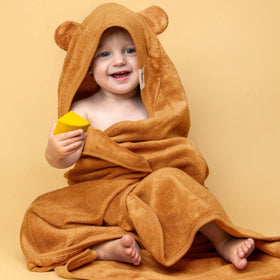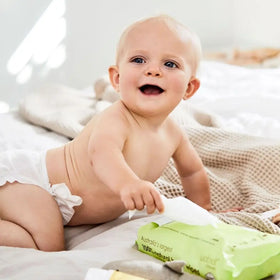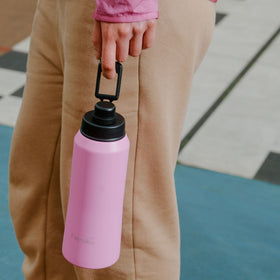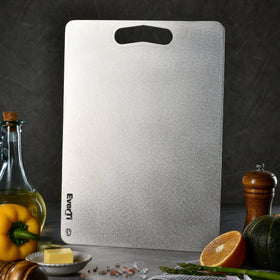
How to Reduce Your Baby's Eco Footprint in 7 Simple Steps
Babies sure do seem to need a lot of stuff, don't they? But even though they need heaps of stuff, there's still lots of ways that you can cut their eco footprint down to size. Here's a few ideas on how:
1. Make your own baby food.
Keep it simple and feed baby what you're feeding the rest of the family, leaving out the salt and spices. If you must buy baby food, and let's face it - even the most organised of us have to occasionally, buy the glass jars. Then you can reuse them to put food in again for your baby. Go with pouches that you can fill and then reuse.
2. Choose natural skin care with responsibly sourced, plant based ingredients.
Go with stuff that you can use for multiple things, like the Dr Bronners liquid soap, which you can use for hair and body. For skincare, choose a balm with multiple uses like the Nature Baby Wonder Balm or Badger Baby Balm. When you choose a multi-use product, you can buy larger quantities and you cut down on packaging, too.

3. Choose natural laundry products.
Every time you wash, your washing waste ends up in our waterways. By using laundry products with better ingredients from a reputable company like ecostore, you're reducing your eco footprint. Avoiding optical brighteners will help our waterways for a start. Line dry wherever possible and avoid the tumble dryer for a way to reduce baby's eco footprint even further.
4. Buy better quality baby toys, and buy fewer of them.
Choose wooden toys made from sustainably sourced wood, like rubberwood from trees that are no longer producing. Buy organic cotton soft toys. They're better for baby, better for the environment, and if you look after them, you can hand them down to younger children, too.

5. Choose cloth nappies.
Even if you only invest in a cloth swim nappy, that will make an impact. Anything that you can reuse is a step in the right direction and will help reduce baby's eco footprint.
6. Don't throw it away - recycle it.
There's a big market for second hand baby goods, and you can make a bit of money by selling items that you no longer need. Even if you don't make that much money, it's so much better for the environment if someone else can use it rather than adding it to landfill.
7. Go organic on foods that matter most.
Apples, berries and stonefruit are the fruits that have the highest levels of pesticides in Australia, so go organic with these. Generally, fruits with thick skins don't absorb as many pesticides, so you don't need to buy things like bananas, melons, kiwis or avocado organic. Leafy greens, herbs and veggies with edible skins have higher pesticide residues, so go organic where possible with these.
Choose organic dairy products, if possible. But if not, free range pork and chicken. Lamb and beef in Australia are all grass fed, so these are not as important to choose organic.
Don't forget, Hello Charlie has a huge range of eco baby, beauty and home products that will help you reduce the whole family's eco footprint!
Images: Depositphoto










